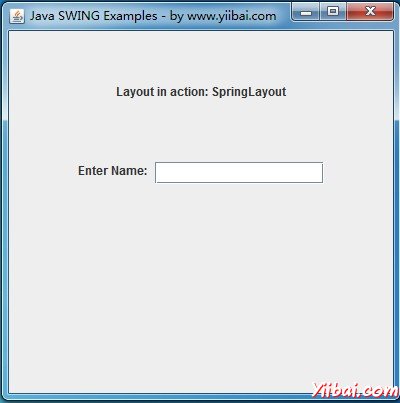Swing SpringLayout布局類
SpringLayout類位置相聯子容器,根據一組約束條件。
類聲明
以下是聲明 javax.swing.SpringLayout類:
public class SpringLayout extends Object implements LayoutManager2
字段域
以下是javax.swing.SpringLayout類的字段:
-
static String BASELINE --指定一個組件的基線。
-
static String EAST --指定組件的邊界矩形的右邊緣。
-
static String HEIGHT --指定組件的邊界矩形的高度。
-
static String HORIZONTAL_CENTER --指定組件的邊界矩形的水平中心。
-
static String NORTH --指定組件的邊界矩形的頂邊。
-
static String SOUTH --指定組件的邊界矩形的底部邊緣。
-
static String VERTICAL_CENTER --指定組件的邊界矩形的垂直中心。
-
static String WEST --指定組件的邊界矩形的左邊緣。
-
static String WIDTH --指定組件的邊界矩形的寬度。
類構造函數
| S.N. | 構造函數 & 描述 |
|---|---|
| 1 |
SpringLayout() Creates a new SpringLayout. |
類方法
| S.N. | 方法 & 描述 |
|---|---|
| 1 |
void addLayoutComponent(Component component, Object constraints) If constraints is an instance of SpringLayout.Constraints, associates the constraints with the specified component. |
| 2 |
void addLayoutComponent(String name, Component c) Has no effect, since this layout manager does not use a per-component string. |
| 3 |
Spring getConstraint(String edgeName, Component c) Returns the spring controlling the distance between the specified edge of the component and the top or left edge of its parent. |
| 4 |
SpringLayout.Constraints getConstraints(Component c) Returns the constraints for the specified component. |
| 5 |
float getLayoutAlignmentX(Container p) Returns 0.5f (centered). |
| 6 |
float getLayoutAlignmentY(Container p) Returns 0.5f (centered). |
| 7 |
void invalidateLayout(Container p) Invalidates the layout, indicating that if the layout manager has cached information it should be discarded. |
| 8 |
void layoutContainer(Container parent) Lays out the specified container. |
| 9 |
Dimension maximumLayoutSize(Container parent) Calculates the maximum size dimensions for the specified container, given the components it contains. |
| 10 |
Dimension minimumLayoutSize(Container parent) Calculates the minimum size dimensions for the specified container, given the components it contains. |
| 11 |
Dimension preferredLayoutSize(Container parent) Calculates the preferred size dimensions for the specified container, given the components it contains. |
| 12 |
void putConstraint(String e1, Component c1, int pad, String e2, Component c2) Links edge e1 of component c1 to edge e2 of component c2, with a fixed distance between the edges. |
| 13 |
void putConstraint(String e1, Component c1, Spring s, String e2, Component c2) Links edge e1 of component c1 to edge e2 of component c2. |
| 14 |
void removeLayoutComponent(Component c) Removes the constraints associated with the specified component. |
方法繼承
這個類從以下類繼承的方法:
-
java.lang.Object
SpringLayout 例子
選擇使用任何編輯器創建以下java程序在 D:/ > SWING > com > yiibai > gui >
SwingLayoutDemo.javapackage com.yiibai.gui; import java.awt.*; import java.awt.event.*; import javax.swing.*; public class SwingLayoutDemo { private JFrame mainFrame; private JLabel headerLabel; private JLabel statusLabel; private JPanel controlPanel; private JLabel msglabel; public SwingLayoutDemo(){ prepareGUI(); } public static void main(String[] args){ SwingLayoutDemo swingLayoutDemo = new SwingLayoutDemo(); swingLayoutDemo.showSpringLayoutDemo(); } private void prepareGUI(){ mainFrame = new JFrame("Java SWING Examples - www.gitbook.net"); mainFrame.setSize(400,400); mainFrame.setLayout(new GridLayout(3, 1)); headerLabel = new JLabel("",JLabel.CENTER ); statusLabel = new JLabel("",JLabel.CENTER); statusLabel.setSize(350,100); mainFrame.addWindowListener(new WindowAdapter() { public void windowClosing(WindowEvent windowEvent){ System.exit(0); } }); controlPanel = new JPanel(); controlPanel.setLayout(new FlowLayout()); mainFrame.add(headerLabel); mainFrame.add(controlPanel); mainFrame.add(statusLabel); mainFrame.setVisible(true); } private void showSpringLayoutDemo(){ headerLabel.setText("Layout in action: SpringLayout"); SpringLayout layout = new SpringLayout(); JPanel panel = new JPanel(); panel.setLayout(layout); JLabel label = new JLabel("Enter Name: "); JTextField textField = new JTextField("", 15); panel.add(label); panel.add(textField); layout.putConstraint(SpringLayout.WEST, label,5, SpringLayout.WEST, controlPanel); layout.putConstraint(SpringLayout.NORTH, label,5, SpringLayout.NORTH, controlPanel); layout.putConstraint(SpringLayout.WEST, textField,5, SpringLayout.EAST, label); layout.putConstraint(SpringLayout.NORTH, textField,5, SpringLayout.NORTH, controlPanel); layout.putConstraint(SpringLayout.EAST, panel,5, SpringLayout.EAST, textField); layout.putConstraint(SpringLayout.SOUTH, panel,5, SpringLayout.SOUTH, textField); controlPanel.add(panel); mainFrame.setVisible(true); } }
編譯程序,使用命令提示符。到 D:/ > SWING 然後輸出以下命令。
D:SWING>javac comyiibaiguiSwingLayoutDemo.java
如果冇有錯誤出現,這意味著編譯成功。使用下麵的命令來運行程序。
D:SWING>java com.yiibai.gui.SwingLayoutDemo
驗證下麵的輸出



